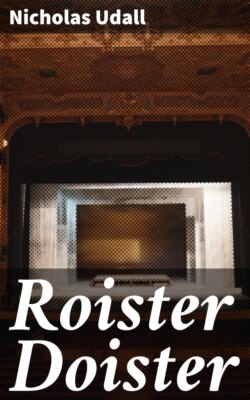| 1520. June 18. æt. 14. | Admitted scholar of Corpus Christi College, Oxford. |
| 1524. May 30. æt. 18. | Takes his B.A. [Wood, Fasti Oxon., i. 65, Ed. 1815.] |
| 1524. Sept. 3. | Elected Probationer Fellow of his College. |
| 1533. May. Whitsun Eve. æt. 27. | Royal MS. 18 A. lxiv. p. 275, has two titles. (1.) Versis and dities made at the coronation of queen Anne. (2.) Hereafter ensuethe a copie of diuers and sundry verses aswell in latin as in Englishe deuised and made partely by Iohn leland and partely by Nicholas Vuedale whereof sum were sette vp and sum were spoken and pronounced vnto the most high and excellente Quene the ladie Anne, wif vnto our sourain lorde King Henry the eight in many goodly and costely pageauntes exhibited and shewed by the mayre and citizens of the famous citie of london at first tyme as hir grace rode from the Towre of London through the said citie to hir most glorious coronation at the monasterie of Westminster on Whitson yeue in th xxvth yere of the raigne of our said soueraigne lorde. |
The Rev. Dr. Goodford, the present Provost of Eton, has most kindly afforded me interesting information obtained by him from the MS. records of the College; viz., the Audit Rolls and the Bursar’s Books, respecting Udall’s connection with Eton.
The salary of the Master at Eton was then £10 a year, or fifty shillings for each of the four terms. In addition, he received 20s. for his ‘livery,’ and other small sums, as for obits (i.e. attending masses for the dead) [e.g. Udall received for obits, 14s. 8d. in 1535, and the same in 1536]; and for candles and ink for the boys [e.g. Udall received for these purposes, 23s. 4d. in 1537, and the same in 1538.] If the assumed multiple of 13 truly express the relatively greater purchasing power of gold and silver more then than now: the salary and emoluments cannot be considered excessive.
| 1534. June 19. | Udall takes his M.A. [Wood, Fasti., i. 98.] |
| 1534–1543. æt. | Udall’s name occurs in the Records spelt indifferently Woddall, Woodall or Udall. His name first appears in 26 Henry VIII., 1534, when his predecessor Dr. Richard Coxe was paid salary for three terms, and Udall received 50s. for the fourth, his first term. The payments continue on regularly so far as the books are extant, up to 1541. The Records for 1542 are missing. It was in March 1543 that occurred the robbery of silver images and other plate by two Eton scholars, J. Hoorde and T. Cheney, connived at by Udall’s servant Gregory, which resulted in Udall’s losing his place. ‘Thomas Tusser, gentleman,’ in The Author’s Life added to his Fiue hundreth points of good husbandrie, 1573, 4to, thus writes, but without giving any date, of Udall’s use of the rod: |
| | Nicholas Vdal schole master at Eton. | From Powles I went, to Aeton sent, To learne straight wayes, the Latin phraise, Where fiftie three stripes giuen to mee, at once I had: For faut but small or none at all, It came to passe, thus beat I was, See Udall see, the mercy of thee, to mee poore lad. |
| 1537. Sept. 27. | Is made Vicar of Braintree. Newcourt, Rep. ii. 89. |
| 1542. | Udall publishes a translation of the 3rd and 4th books of Erasmus’ Apophthegms. |
| *1543. | Cott. MS. Titus, B. viii. p. 371, is a long letter, undated and unaddressed, to some one, as to ‘my restitution to the roume of Scholemaister in Eton.’ |
| 1544. Dec. 14. | Resigns the Vicarship of Braintree. Newcourt, idem. |
| 1542–1545. | He is engaged with the Princess, afterwards Queen Mary and others in translating Erasmus’ Paraphrase of the New Testament into English. |
| ’1545, Sept. 30, at London,’ date of his Preface to Lake. |
In his Pref. to John, partly translated by Princess Mary, partly by Rev. F. Malet, D.D.; Udall gives us the following account of female education in his day: which can only, however, apply to a few women, like Elizabeth, Mary, and Lady Jane Grey. ‘But nowe in this gracious and blisseful tyme of knowledge, in whiche it hath pleased almightye God to reuele and shewe abrode the lyght of his moste holye ghospell: what a noumbre is there of noble women (especially here in this realme of Englande,) yea and howe many in the yeares of tender vyrginitiee, not only aswel seen and as familiarly trade in the Latine and Greke tounges, as in theyr owne mother language: but also both in all kindes of prophane litterature, and liberall artes, exactely studied and exercised, and in the holy Scriptures and Theologie so ripe, that they are able aptely cunnyngly, and with much grace eyther to indicte or translate into the vulgare tongue, for the publique instruccion and edifying of the vnlearned multitude. … It is nowe no newes in Englande to see young damisels in nobles houses and in the Courtes of Princes, in stede of cardes and other instrumentes of idle trifleyng, to haue continually in her handes, eyther Psalmes, Omelies, and other deuoute meditacions, or elles Paules Epistles, or some booke of holye Scripture matiers: and as familiarlye both to reade or reason thereof in Greke, Latine, Frenche, or Italian, as in Englishe.’
